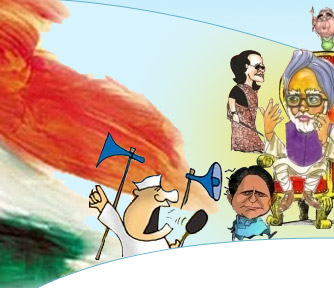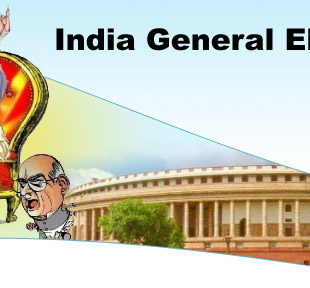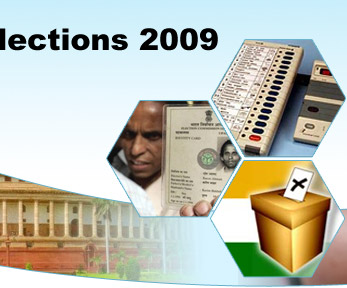Sushma Ramachandran | 13 Apr, 2009
In these times of financial gloom, the process of elections in the world's largest democracy is bringing with it some sort of silver lining for the economy as large sums of money are being spent by political parties and candidates to ensure victory at the hustings.
The fact is every five years the general elections provide significant stimulus to economic growth as this great Indian juggernaut cannot move forward without injecting massive funds across the country for administrative, security and campaigning needs.
Reams of newsprint and unending hours of television time is spent documenting the process of selection of candidates, unveiling of manifestos and coalition-building that is now becoming increasingly crucial to forming a government in New Delhi.
Even though election issues are multifarious with caste and regional considerations appearing to be paramount, judging by the focus being given to them by the parties in selection of candidates, economic considerations are key factor for voters.
In some states, voters have made it clear that development is a critical issue. These include Gujarat and Madhya Pradesh where the incumbent chief ministers were voted back based on their track record in improving the quality of life in these areas.
The state of the economy has become an even more significant factor in recent months because of the recessionary conditions. The dip in exports owing to the fall in global demand has hit many sectors of the economy and led to widespread job losses.
These include industries like textiles, garments, gems and jewellery and handicrafts that employ hundreds of thousands of artisans who have been laid off, setting a process of reverse migration back to the villages they had left many years ago.
The elections are pump-priming the economy in many ways. Political parties have to tie up vehicles for transportation to rural areas, which are often remote and inaccessible. Apart from thousands of cars and sports utility vehicles, some of the candidates have also chosen helicopters as their transport of choice.
This is especially so for leaders who have to traverse many regions to campaign for their parties. Star campaigners like Congress party president Sonia Gandhi and Bharatiya Janata Party's (BJP) prime ministerial candidate L.K. Advani, much in demand by their parties, have no option but to travel by choppers in most states owing to time constraints.
This inevitably translates into big funds being poured into the transport industry.
The enormous infusion of funds into the economy by such political activity is bound to bring some respite from the slowdown that has gripped the country. Parties are spending not just on transport but a wide range of other services in order to build up the tempo needed before the polls.
For instance, the advertising and public relations industry got a bonanza with both the Congress and the BJP having tied up with leading agencies for print and electronic media campaigns.
Even Uttar Pradesh Chief Minister Mayawati has released a promotional film that equates her Bahujan Samaj Party (BSP) with dynamic progress with patriotic tunes as the background score. This has come at a time when the advertising industry is facing a dire slump owing to the drastic reduction in ad spends by India Inc.
The elections also bring about a spurt in the availability of jobs, though these are in the nature of temporary employment. The hurly burly of elections, with many constituencies seeing numerous candidates in the fray, leads to demand for people to fill up a variety of tasks that are unique to this event.
These include quirky jobs like the verses-on-demand poets who recite couplets promoting candidates. There are also the rank and file of political parties that need to be compensated for their hard work in door-to-door campaigning as well as other ancillary activities involved in the election process.
In developed countries like the US volunteers are normally relied upon but in this country even enthusiastic volunteers need some form of financial compensation to survive on a day-to-day basis.
Of course, heavy spending by political parties on elections will not rid us of recessionary trends. But it will put more money into the hands of people in certain sectors and thereby provide some amount of demand push to the economy.
A recent study by the Centre for Media Studies, a city-based think tank that analyses communications and media trends in the country, estimates that Rs.10,000 crore ($2 billion) will be spent on the national elections this year.
The media, for instance, which has been in the doldrums, will look forward to the elections as a phase when eyeballs once again will be attracted to the idiot box. And this in turn will promote more advertising by companies that are aware that the general elections make politics nearly as interesting as cricket matches, even though it may be for just a month or so.
This interest looks like continuing till the formation of the government, which may take more time than usual, given the fact that the permutations and combinations of alliances are likely only after the elections this time.
As a result, the media is likely to continue having a field day in terms of grabbing public interest, for a longer period than in the past. Hopefully, this may improve the bottomlines of many electronic media companies that are now in dire financial straits.
In sum, the gigantic Indian election process may ultimately provide some relief in these times of doom and gloom to some sectors of the economy. The money power that the political parties are displaying in their campaigns will gradually filter down to the common man. Hopefully, this will add to the process of bringing the economy out of the downward spiral of the past six months.
* The author is a freelance writer.
* The views expressed by the author in this feature are entirely his own and do not necessarily reflect the views of SME Times.


